Here we explain why sustainability in swimwear is such an important consideration, and we've compiled a list of brands that already produce ethical swimwear so finding it couldn't be easier.
When you start imagining those balmy hot days of summer, your thoughts might turn to what you’ll be wearing as the seasons change, whether on the beach, in the pool, or even a lakeside bar.
This year instead of searching amongst the usual brands we really encourage you to think about some of the ethical swimwear brands that have emerged in recent years. That’s right, swimwear that’s sustainable and looks great, for people of all shapes, sizes and styles.
To help you out we’ve built a list of ethical swimwear brands from the UK and Europe who’ve been making sustainable swimwear, so that what you wear in the sea doesn’t damage the sea.
[Now it couldn’t be easier find ethical fashion online. Click here to discover sustainable products from all across Europe.]
Why sustainable swimwear matters so much
When it comes to swimwear we expect certain unique properties that we don’t from our normal clothing. After all we’re not jumping in and out of salty or chlorinated water in our cotton t-shirt, are we? And if you are, then you’ll know how uncomfortable this is.
The fact is, for swimwear to be practical it has to dry quickly, and for a material to dry quickly, unfortunately, it has to contain at least some plastic. In the case of swimwear this means nylon, or polyester. Both have their advantages, nylon is harder wearing and more stretchy, whereas polyester is more UV resistant, and tends to dry a little faster.
As you might know these materials are essentially made by heating petroleum in a process called polymerisation, which produces a whole lot of unpleasant greenhouse gases.
For a start, one polyester t-shirt has a carbon footprint of 5.5kg, almost three times more than that of a cotton t-shirt. And our use of polyester is on the rise, more than doubling since the year 2000, and now accounting for more than 40% of the total CO2 footprint of the fashion industry.
Nylon is perhaps worse still as it’s production also creates nitrous oxide (N20), a gas that’s 300 times more damaging than CO2. The incredible longevity of N20 allows it to reach the upper atmosphere where it disrupts the stratospheric ozone, an essential filter of UV radiation.
The problems with these synthetic materials don’t stop here. Not only is production seriously toxic, but like all plastics, they are not biodegradable, persisting in the environment for hundreds of years before they eventually break down.
Everytime you wash garments made with polyester or nylon they release thousands of microfibres into our waterways, which are now proven to cause immense damage to marine life. These little fragments of plastic affect thousands of species, by blocking digestive tracts, reducing growth rates, changing feeding behavior, and reducing the rate of reproduction. Not good at all.
There is a strange irony that the clothes we wear to enjoy the ocean are made of the exact materials that contribute to destroying the life that depends on this vital ecosystem.
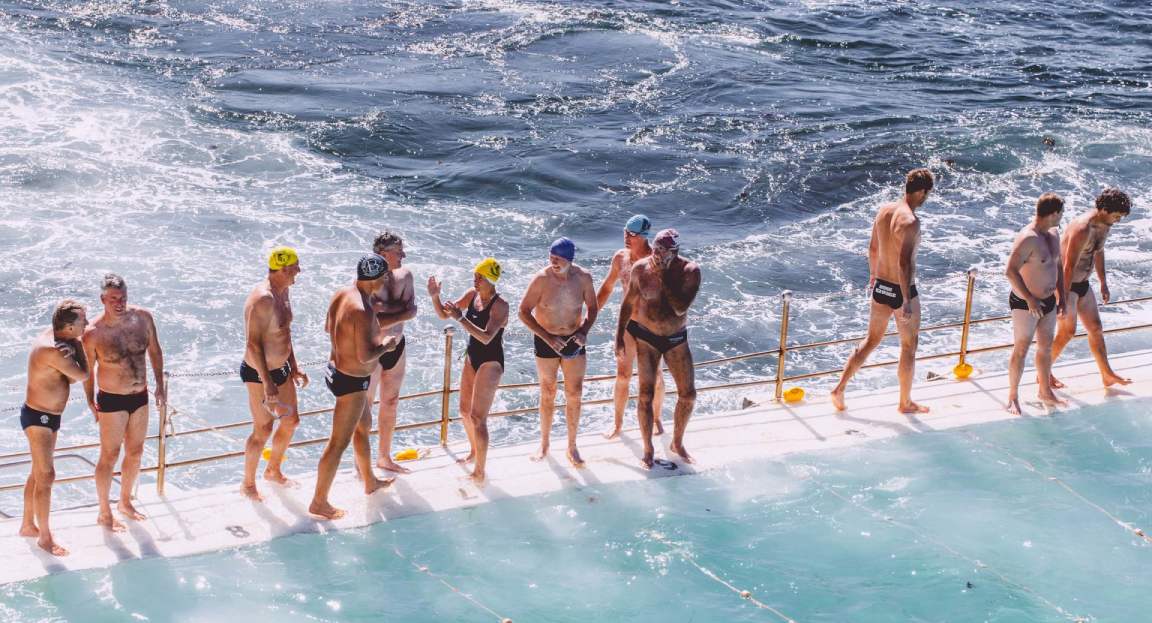
What makes swimwear sustainable
It goes without saying that traditional swimwear made from nylon or polyester is bad for the environment on many levels. Fortunately, some ethical swimwear brands are now designing and utilising technology in a way that helps minimise their environmental impact, making more sustainable swimwear a reality today.
Materials
When it comes to ethical swimwear brands there’s one fabric that you’ll see used by almost everyone. It’s called ECONYL®, and it’s technically a type of regenerated nylon.
Inspired by the environmental crisis caused by synthetic fibres Italian plastics company Aquafil decided to reengineer the manufacture of nylon. Realising that digging up more oil to make nylon was the heart of the problem, they developed a system that breaks down old existing nylon into monomers, which are then rendered back into a polymer state, giving us new nylon from old nylon. This can be spun and woven to create fabric with exactly the same properties as you can achieve with conventional nylon, without extracting any raw materials from the plant.
The source of nylon for recycling in this way comes from all over including fabric scraps, landfills, old carpets, and even ocean waste such as fishing nets, which produces a particularly nice narrative for brands making sustainable swimwear with ECONYL®.
Of course the process is not perfect, breaking down and reforming nylon does require a fair amount of energy, so it’s not exactly carbon neutral. However, according to Aquafil for every 10,000 tonnes of ECONYL® produced we save 70,000 barrels of oil, and we avoid emitting 57,100 tonnes of CO2.
What’s more, in theory ECONYL® can be recycled in this way over and over again in a closed loop, so as this technology evolves we hope that there will be no need to produce nylon from raw oil in the near future.
[Begin your ethical shopping journey today - It couldn’t be easier with our lighting fast fashion search tool.]
Washing
How we wash our clothes is so often ignored as an environmental factor, but when it comes to clothes made from plastics, like our swimwear, we need to take note. As already mentioned swimwear will release thousands of harmful micro plastics every time you wash it, so how do we mitigate against this effect?
One answer is pretty simple, wash your clothes less! When it comes to swimwear, the truth is you don’t need to put them through the wash that often, a rinse with fresh water is usually enough. However, if and when you do need to wash them, use cold, delicate wash cycles whenever possible.
Another more radical solution is to use guppy bags. These wash bags use a specially designed micro-filter material to filter out the microplastics during a wash cycle, so you can clean your clothes without dirtying our waterways.
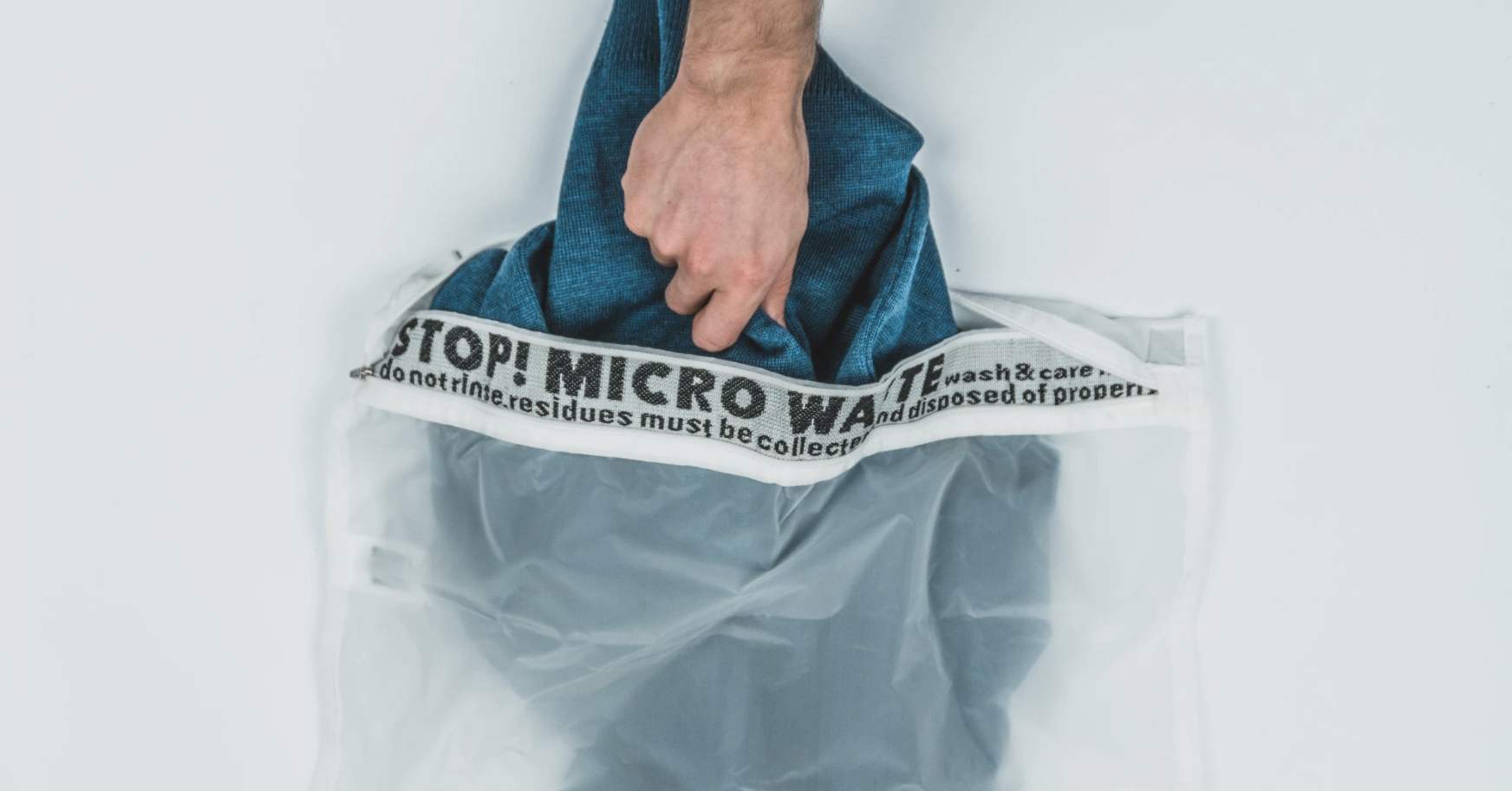
Durability
In terms of sustainability there is one mantra that we can and should always follow, ‘buy less and buy to last’. When it comes to swimwear, even sustainable swimwear, this is extra important because the fact remains that we are still using plastic, so the longer we use it the smaller the CO2 footprint of each item.
It’s about changing our mind set; wanting a little less, and being prepared to pay a bit more for something that’s built to last. The truth is a lot of the ethical swimwear brands listed below are at least twice the price of your conventional bikini or board shorts, but most of them are also made to much higher production standards. Many are manufactured in Europe and the UK, with real emphasis on quality and long life. So, make the next swimsuit one that you’ll really love year after year.
The List: Must See Ethical Swimwear Brands
We’ve done the digging so you can skim through to find the ethical swimwear brand that’s right for you.
Ratings are based on our own research, which is derived from publicly available information on brand sites, media sources, and online reviews. Scores are out of 15, and broken down into 3 sections, ‘use of plastics’, ‘build quality’, and ‘Social impact’.
Styles are indicated for women or men, but of course we wholeheartedly support a man in a bikini or a woman in board shorts, and everything in between. Everyone should feel comfortable on the beach.
Tucca Swim
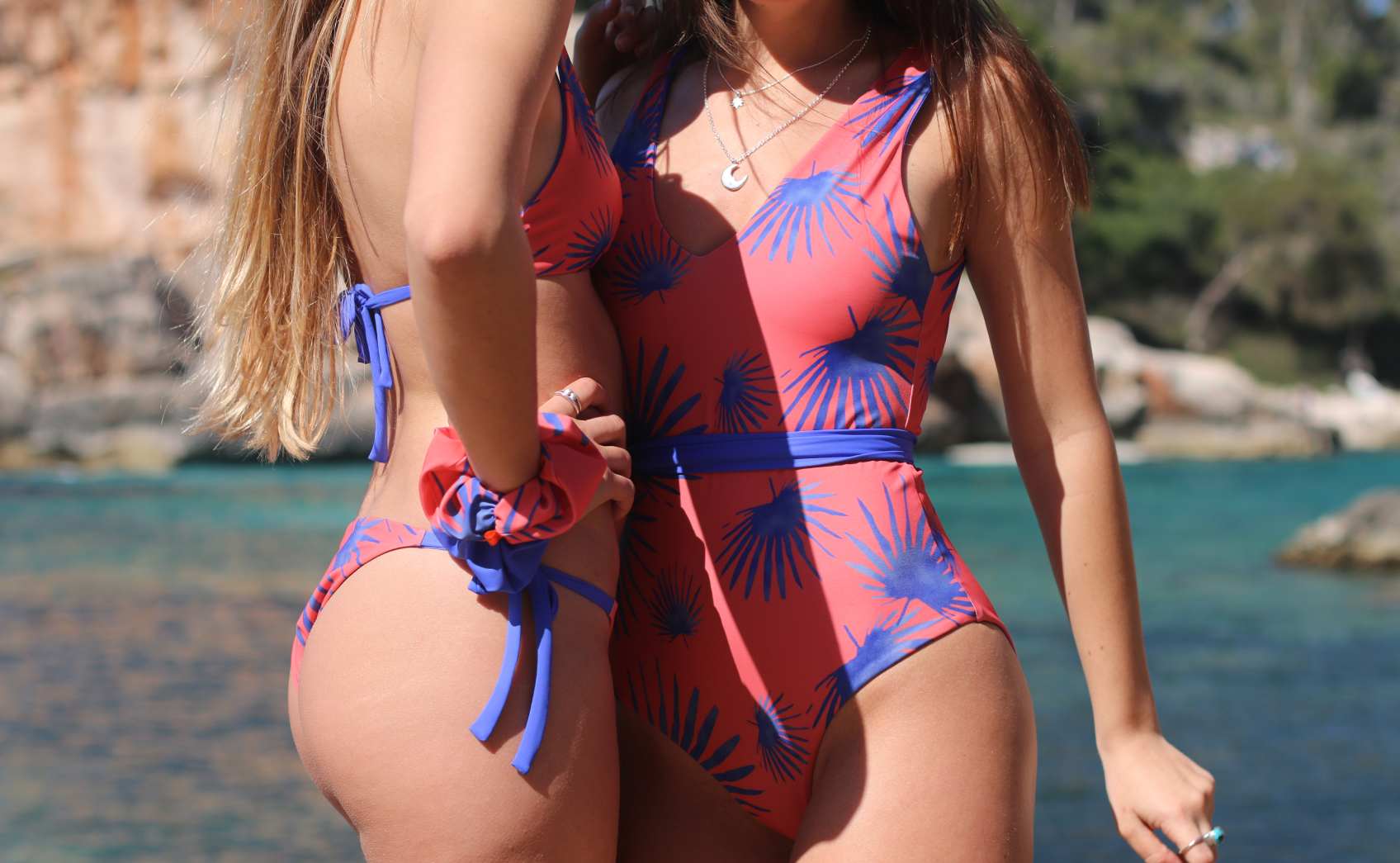
Score = 12
Use of plastics 4/5, Build quality 4/5, Social 4/5
Styles for women only
Price range: £80 - £120
Tucca Swim is a small brand set up by two sisters on a mission to make stylish, sustainable swimwear. Their collection is small and renewed just once a year, in keeping with their ‘less is more’ approach to production.
Their signature style is a fully reversible bikini, with one side plain and the other patterned, so you can choose your style as you change your mind, with a quick shimmy under a towel. The patterns take natural forms, and the cuts are classic in style.
They use approximately 78% ECONYL® fibre in all of their products, and manufacturing is carried out in London. Yes that still happens. As of 2020 they operate a pre-order system, helping them to minimise their waste. Their packaging is biodegradable and plastic free.
To add a bit of stretch they do use around 22% elastane (a type of plastic), and though it is not stated clearly in the product descriptions this seems to be a virgin material. Beyond this infringement Tucca Swim are a really decent ethical swimwear brand for the conscientious beach goer.
Vanilla Sand

Score = 12
Use of plastics 4/5, Build quality 4/5, Social 4/5
Styles for Men and Women
Price range: £70 - £100
Lisbon based Vanilla Sand have tried to centre their business around nature, and they’ve done a pretty decent job of it.
They make the full range of swimwear, including bikinis, swimsuits, and swim shorts. Designs are heavily influenced by brazilian beach culture, ranging from classic looks through to more sheek styles straight out of Ipanema beach.
They use 100% recycled polyester for their swim shorts, ECONYL® in all of their swimsuits and bikinis, as well as certified organic cotton when they venture off the beach with a small part of their range. To really minimise waste they even make eco hair scrunchies from leftover material. A nice touch to complete that beach outfit.
They manufacture in Portugal and Brazil using artisanal techniques in facilities that are FAIRTRADE® certified. And to cap it all off they are part of an Amazon reforestation program, so one new tree is planted for every time sold.
All in all, a really stylish, ethical option for both men and women, at quite affordable prices.
Lilliput & Felix
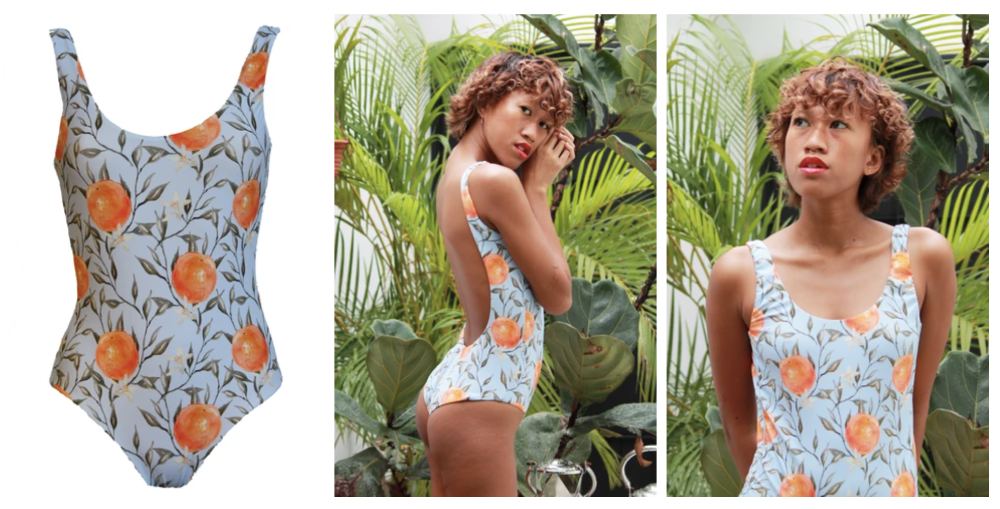
Score = 9
Use of plastics 2/5, Build quality 4/5, Social 3/5
Styles for Women only
Price range: £95 - £200
Lilliput & Felix describe themselves as a luxury, sustainable swimwear brand. The emphasis is on nostalgia, and classic styles which can be tied up to fit almost everyone, or so they say at least.
They have been awarded ‘positive luxury’ status, which I imagine helps when you are buying a swim suit for £200. They are certainly not cheap, but aesthetically you can see why with some of the most vivid patterns and colours that we’ve seen on any clothing, let alone swimwear.
As far as sustainability goes they make a reasonable effort, using recycled plastic fibres for their solid colour and printed garments, and repurposing unused fabric to minimise waste. They also deliver with biodegradable packaging (why wouldn’t you), and manufacture in Portugal where they are committed to responsible labour practices.
On the downside, many of their products still list regular polyamide/elastane as virgin materials, but they don’t actually detail how much is used in each garment, which is a little odd if not just careless. In addition, their beachwear range features a lot of cotton that doesn’t seem to have received organic certification. For dresses that cost £355 this seems a little churlish from a brand that claims to be environmentally conscious.
There is no doubt Lilliput & Felix make some beautiful garments, but they do seem to put the style ahead of sustainability a little too often. They could do better.
Riz Board Shorts
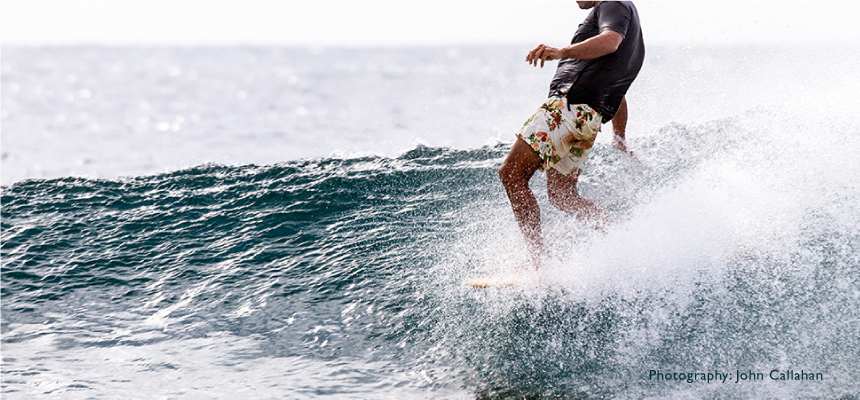
Score = 14
Use of plastics 5/5, Build quality 5/5, Social 4/5
Styles for Men only
Price range: £90 - £100
Back in 2009 friends Riz Smith and Ali Murrell set out to ‘make the most beautiful and sustainable swim shorts in the world’. It was a bold if not slightly odd task, which they have really thrown themselves at, inspired by their idea of ‘Saville Row for the Sea’.
The brand specialises in board shorts with all kinds of weird and wonderful patterns, plus a few hats thrown in to complete your look. Their shorts have a tailored feel, with a vast range of different sizes and fits to suit just about everyone, from Mitch Buchannon to Danny Devito. They also place a genuine emphasis on durability, frequently using triple stitching to ensure their garments are more than a one season wonder.
In terms of sustainability they really nail it, making all of their board shorts from 100% recycled material, which is for the most part recycled polyester. What’s also great to see is their ‘Rizcycle’ scheme, which offers you the chance to return your used shorts in exchange for 25% off your next pair. Meanwhile, they will remanufacture new shorts from your old ones making them one of the few ethical swimwear brands having a go at authentic circular fashion.
To cap it all off they donate £1 to Marine Conservation for every pair sold. These guys really do care about the ocean, so if you want a pair of durable, well fitted, sustainable board shorts then look no further than Riz Board Shorts.
Stay Wild
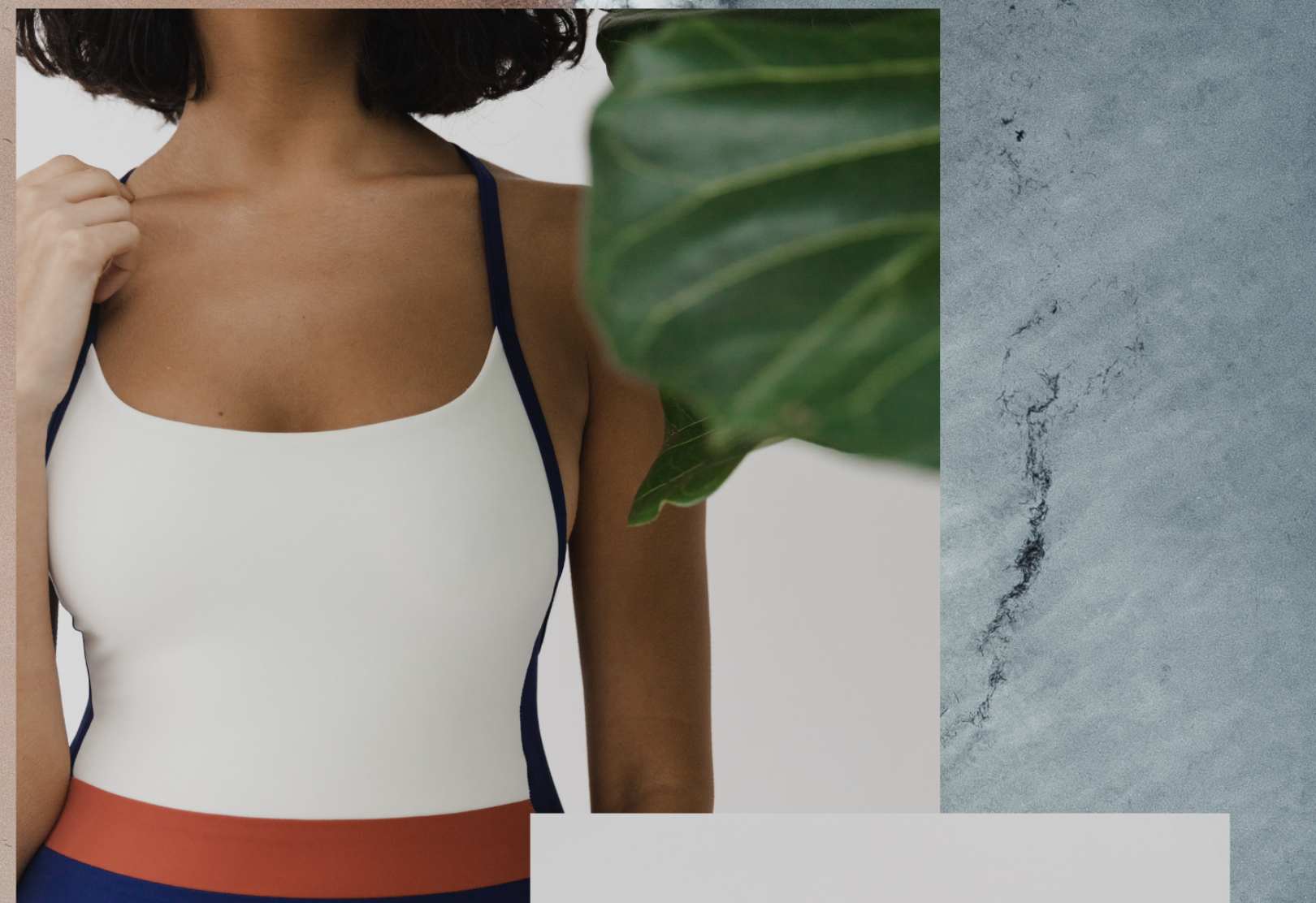
Score = 13
Use of plastics 4/5, Build quality 5/5, Social 4/5
Styles for Women only
Price range: £70 - £170
Stay Wild is a boutique London based brand creating simple, clean cut sustainable swimwear with beautiful block colouration. This is contemporary style designed to suit everyone, of all shapes and sizes. Their ethos is to buy less and buy better, so designing to last is a priority. Encouraging customers to invest in their swimwear and use it for years to come.
They manufacture in London so that they can remain involved in the production process, far surpassing industry ethical standards. And like most brands on this list their primary material is ECONYL®, so there’s very little virgin plastic going into their garments. Of course, their packaging is all recyclable and/or biodegradable, and they use a carbon neutral delivery service.
A nice touch is that they actively encourage the use of guppy bags, designed to minimise the release of microplastics into the water system. Plus, they are making a real effort towards becoming fully circular over the next few years.
They are not the cheapest, but they make really great swimwear that’s designed to last, so you do the math.
Blue Buck
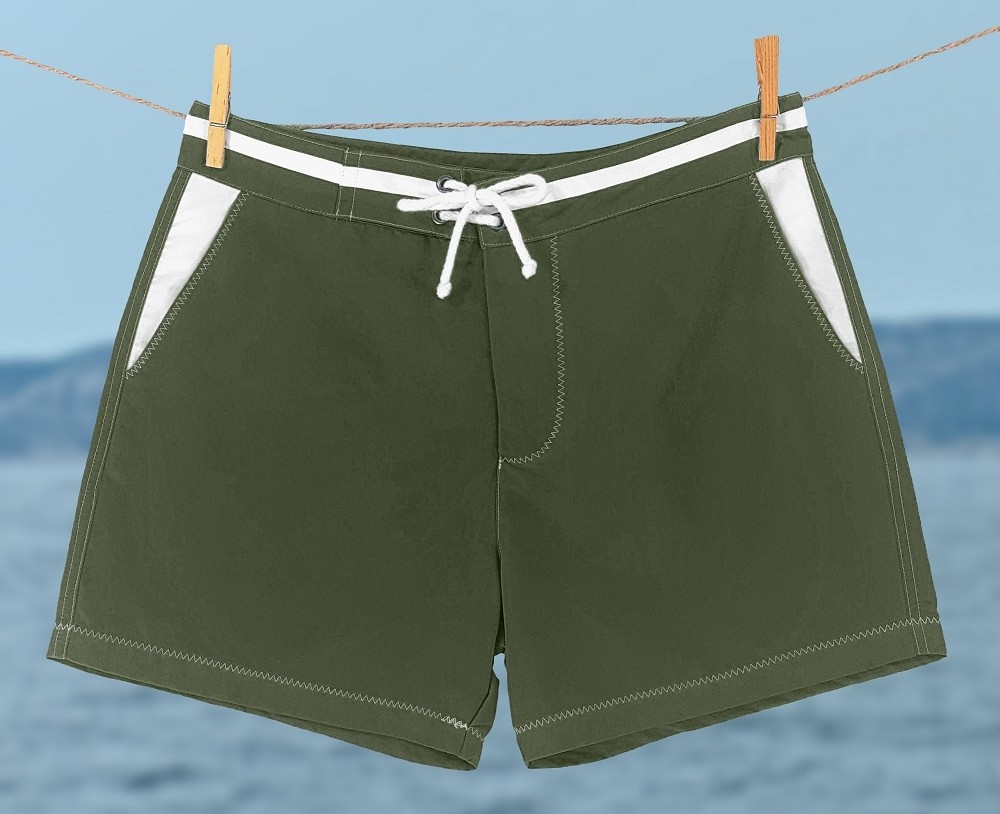
Score = 12
Use of plastics 4/5, Build quality 4/5, Social 4/5
Styles for Men only
Price range: £75 - £75
Another London based brand, Blue Buck, makes a very small range of sustainable swimwear. They really just have one swim short design, which they produce in 3 or 4 different colours, so if you are looking for lots of choice then they are probably not the brand for you.
They are however pretty sustainable, using SEAQUALTM polyester, a type of upcycled marine waste, for almost all parts of their swim shorts. Their yarn is spun in Spain, and woven into fabric in Portugal, where their factory is 50% powered by renewable energy.
They have quite a macho image as the name might suggest, but they do design to last, so if you like the simple shorts they produce, then they offer nice ethical swimwear at a reasonable price.
Love Brand
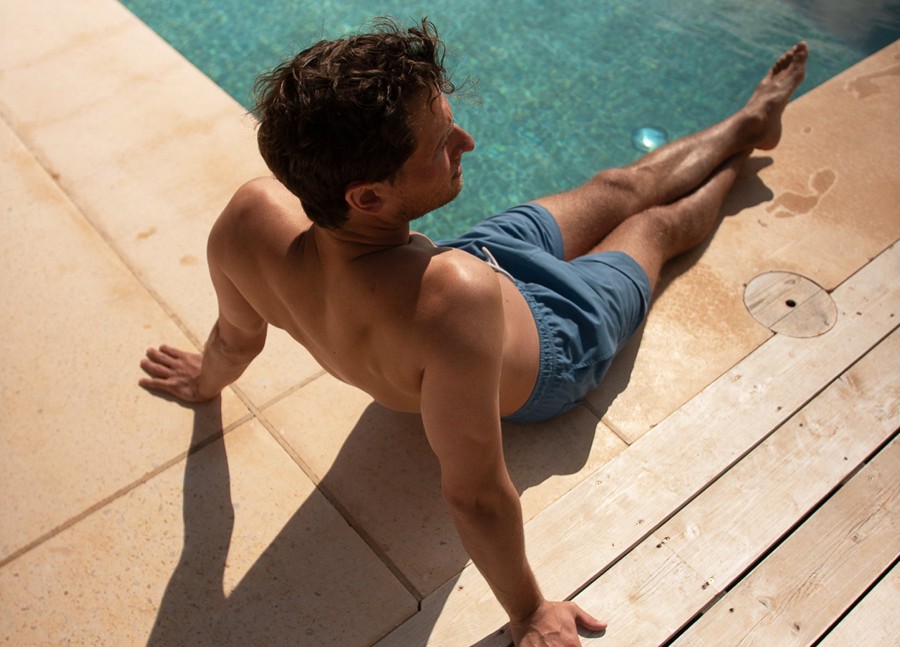
Score = 10
Use of plastics 2/5, Build quality 4/5, Social 4/5
Styles for Men only
Price range: £100 - £120
Love Brand is a lot more than just an ethical swimwear brand, producing a whole range of semi-luxury menswear, suitable for the summer months, including a huge selection of linen shirts and trousers.
However, we are here to focus on swimwear, for which Love Brand makes one classic style in a range of plain pastel colours, and simple prints. There’s something for everyone.
Love Brand states that ‘that style and sustainability must go hand in hand’, and there’s no doubt that overall they are an environmentally conscious brand. They produce more than 95% of their products in Europe, including the fabrics themselves. They use buttons made from Corozo nuts. They are 100% vegan (a given with their product range), and all hang tags, labels, and packaging uses 100% recycled material.
When it comes to printing their swim shorts they use a process of dye-sublimation which produces zero waste and removes the need for water in the printing process.
However, despite these impressive credentials a lot of their current range of swim shorts are only made from 53% recycled polyester, which is a bit disappointing as you’ll see most brands on this list have gone all the way, using up to 100% recycled material.
They are fully aware of this problem, and in the process of rectifying it with their new range of Staniel swim shorts, made from 100% recycled polyester. Plus, we are assured that they’ll be returnable for re-manufacture at some point soon. So, we take our hat off to their progress, even if they are not quite there yet.
If you are buying Love Brand swim shorts go for the Staniel range, and you are definitely making a sustainable swimwear choice.
Talia Collins
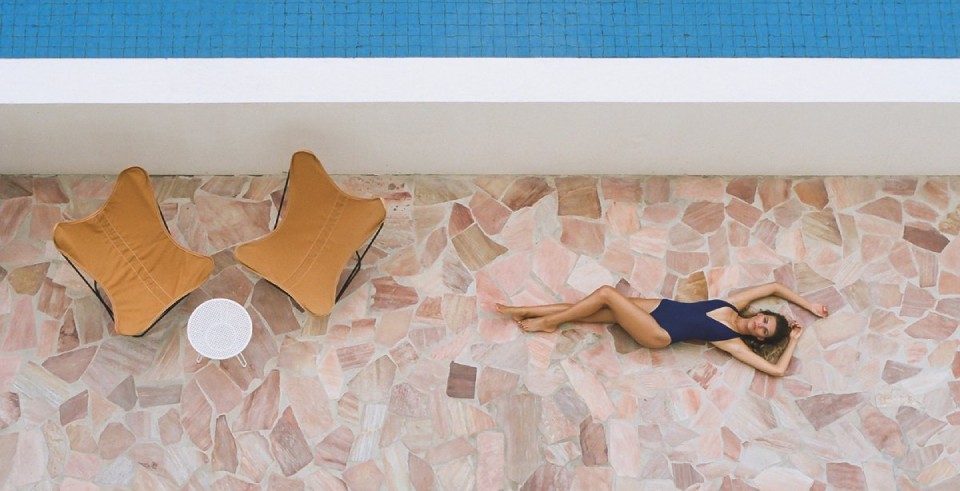
Score = 13
Use of plastics 4/5, Build quality 5/5, Social 4/5
Styles for Women only
Price range: £158 - £158
Talia Collins is a former Vogue Paris stylist that switched to creating her own ethical swimwear brand for women. Her range includes bikinis and swimsuits, all using simple rich colours and sophisticated designs. The image is definitely high-end and classy as opposed to tropical beach vibes, but you can still buy bikini tops and bottoms on a mix and match basis.
Talia says that her ‘collection is aimed at women who care about their clothes, where they come from and their afterlife’, and the brand is pretty faithful to this ethos. They use a combination of ECONYL® and Xtra Life™ Lycra® to create sustainable swimwear that’s designed to last, supposedly a lot more resistant to abrasions, sunscreens, and tanning oils.
To cap it off they’ll take responsibility for your waste. If you send back your used swimwear you’ll receive 20% off your next purchase. Plus, 10% of their profit goes to Healthy Seas, a charity that tackles problems of ghost fishing caused by the modern fishing industry.
For a hint of luxury that takes sustainability seriously, Talia Collins offers some great options for a sophisticated look this summer.
Deakin And Blue

Score = 14
Use of plastics 4/5, Build quality 5/5, Social 5/5
Styles for Women only
Price range: £100 - £130
Deakin And Blue was founded off the back of frustration. A frustration at the fact that ‘swimwear offered either style or substance but almost never both’. On the principle that these things should not be mutually exclusive Deakin And Blue have been on a mission to create sustainable swimwear that’s both functional and looks great.
In particular they focus on de-sexualising the image of women’s swimwear, creating sizes and styles for literally everyone. Unlike most brands they go out of their way to make sure their customers feel comfortable, recognising that ‘no two size 12 bodies are the same’, and designing for UK dress sizes 8-20. Quite rightly, they are proud proponents of a positive female body image, and their blog is a real testament to this.
They focus on elegant simple designs, using bold block colouration, for both their swimsuits and bikinis.
From a sustainability standpoint they are pretty good too, using ECONYL® Polyester, and sustainable Italian Lycra®, in all of their products. They emphasise quality and durability, encouraging customers to look after what they have, instead of buying new every season. They also design and manufacture in the UK, with maximum transparency in their supply chain an absolute given.
Deakin And Blue is a brand that is conscientious in just about every way, so we actively encourage you to check out their range if you need some sustainable swimwear this summer.
Ecoalf
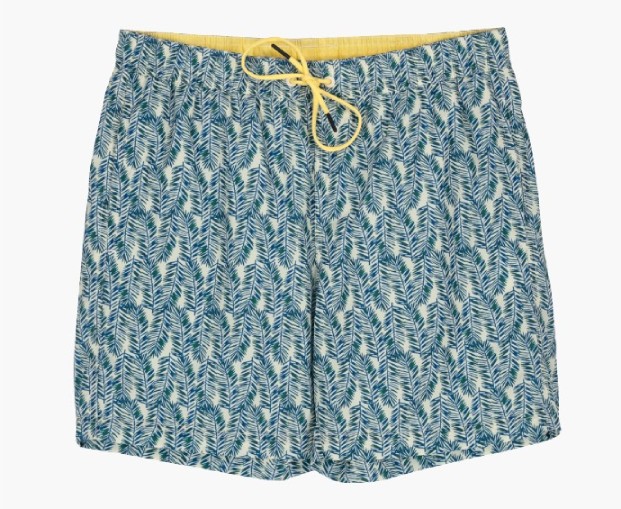
Score = 13
Use of plastics 4/5, Build quality 4/5, Social 3/5
Styles for Men only
Price range: £90 - £100
Spanish brand Ecoalf produces a huge range of ethical clothing, and are committed to working in harmony with the environment and people alike, so we recommend you check out some of their other products when the beach season is over.
Unfortunately when it comes to swimwear they still only produce board shorts, but fortunately they do this well. Most of their styles are heavily patterned, but with a subtlety of colour to tone things down. Some are also plain with a classic shorter cut, and all are well fitted.
They use ECONYL® regenerated nylon for the whole range, with just a small amount (5%) of Polyurethane in some of their products. They don’t specify where exactly they manufacture but there is a strong emphasis on regulation and transparency. A very respectable choice for your new board shorts, and because they seem to have a sale on most of the time, they’re usually a more affordable sustainable swimwear option.











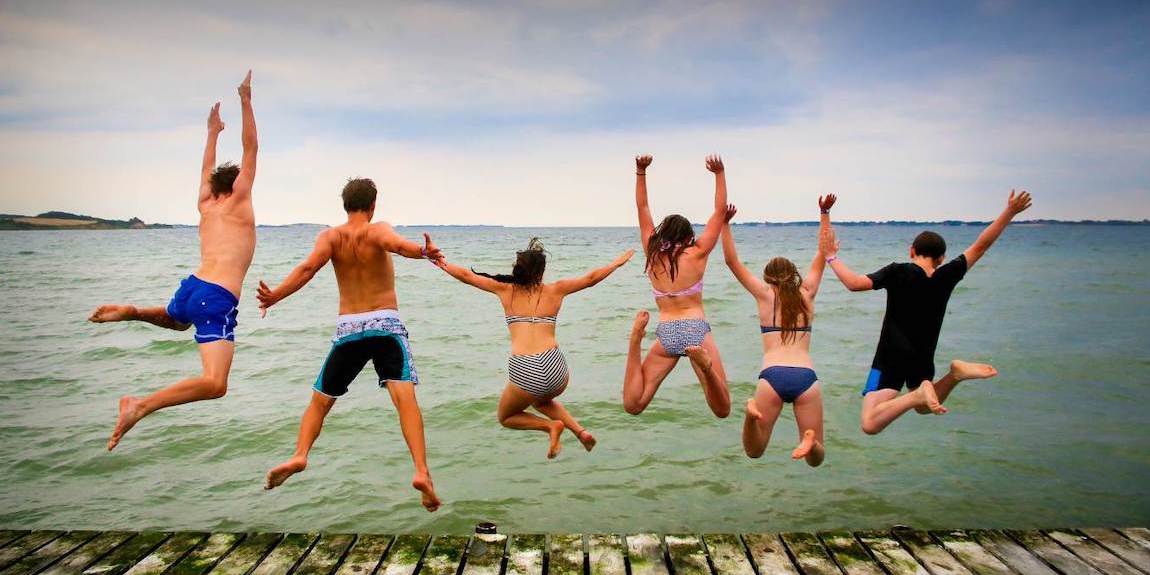
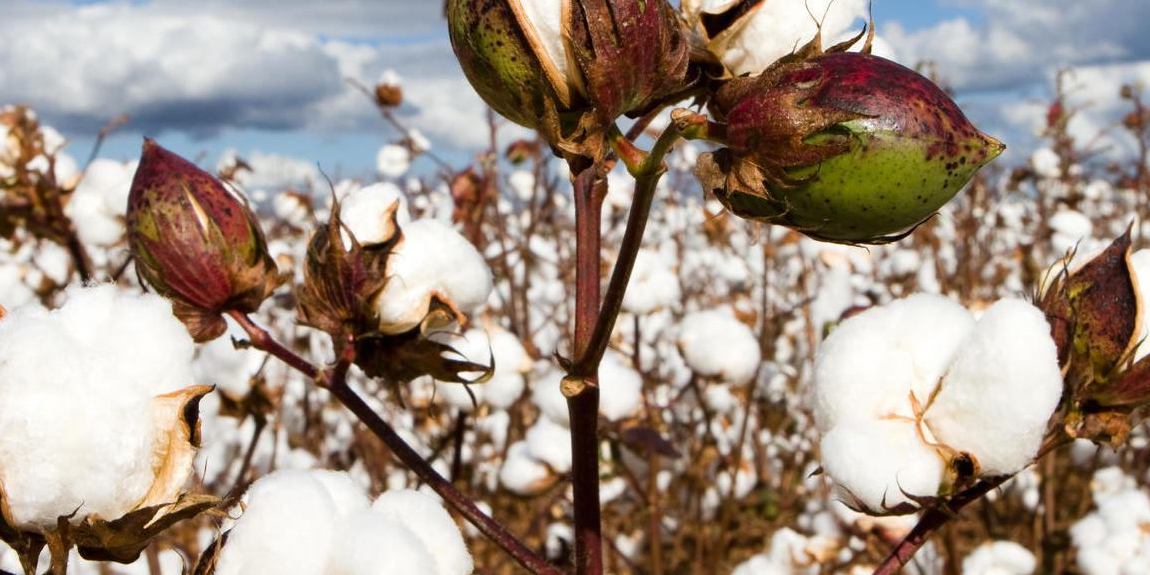

 Be the first to know when Europe's top ethical brands are on sale, sign up to our newsletter here
Be the first to know when Europe's top ethical brands are on sale, sign up to our newsletter here